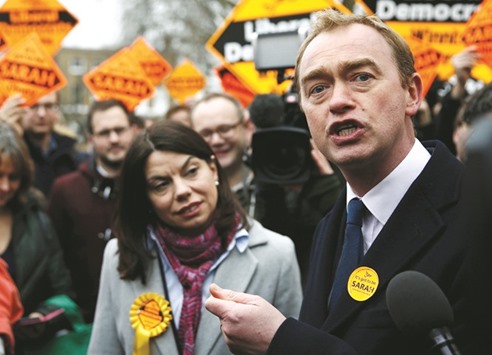The Liberal Democrats secured a stunning by-election victory to unseat Zac Goldsmith by convincing up to a third of Leave-supporting Tory voters to switch to the party, Tim Farron has claimed, adding that the outcome could change the direction of British politics.
The LibDems overturned a 23,000 majority on Thursday to remove the former Conservative MP in a vote that became a de facto plebiscite on the government’s Brexit plans.
Sarah Olney, the winning candidate, took just under 50% of the entire vote to record a majority of 1,872. Large numbers of local Labour voters backed her, with the Labour candidate, Christian Wolmar, losing his deposit.
Speaking alongside Olney in the south-west London constituency yesterday morning, Farron was cautiously optimistic about the LibDems’ chances in a general election but said: “This result might change the direction of British politics. It’s about momentum.”
The party leader added: “If I tell you that nearly a third of Tory voters from the last election who voted Leave in June voted Liberal Democrat on Thursday, you will see that this is not just about a Remain versus Leave rerun, it’s about people trying to say to Theresa May: we do not like the extreme version of Brexit outside the single market you are taking us down.”
Olney, a local accountant who only became involved in politics a year ago, took to the stage at the announcement of her victory in the early hours of yesterday to say voters had “sent a shockwave through this Conservative Brexit government”.
She added: “And our message is clear: we do not want a hard Brexit. We do not want to pull out of the single market. We will not let intolerance, division and fear win.”
Olney won 20,510 votes, up 30.4% on the party’s 2015 result, against 18,638 for Goldsmith. She is the LibDems’ ninth MP in this parliament, and the only female LibDem MP.
Goldsmith, who had held the seat since taking it from the LibDems in 2010, had resigned in protest against the government’s decision to back a third runway at Heathrow, instead standing as an independent candidate in a byelection he argued should be seen as a gauge of local opinion on airport expansion.
But the LibDems based the debate around Brexit, arguing that one of the most strongly pro-Remain constituencies in the country should have a say on being represented by an MP who supported leave, albeit quietly.
Olney insisted the impetus for this had come from voters. She told the Guardian: “It wasn’t a conscious choice in that respect; it was us responding to what constituents were talking about. And we’ve always been a pro-European party. We were the united Remain party.”
Farron said: “This was a remarkable, come-from-nowhere upset that will terrify the Conservatives … If this was a general election, this swing would mean the Conservatives would lose dozens of seats to the Liberal Democrats – and their majority with it.”

Liberal Democrat winner of the Richmond Park by-election, Sarah Olney, celebrates her victory with party leader Tim Farron on Richmond Green in London yesterday.
